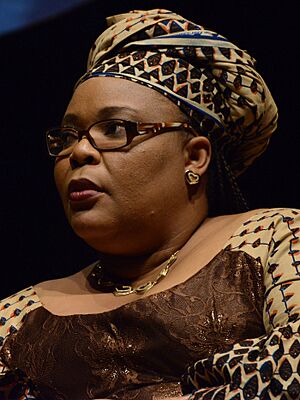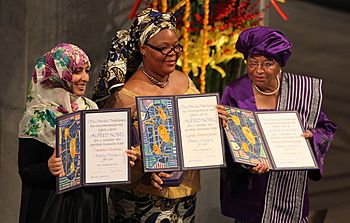Leymah Gbowee facts for kids
Quick facts for kids
Leymah Gbowee
|
|
|---|---|

Gbowee in 2013
|
|
| Born |
Leymah Roberta Gbowee
1 February 1972 Central Liberia
|
| Nationality | Liberian |
| Education | AA degree in social work, Mother Patern College of Health Sciences, Monrovia, Liberia; MA in conflict transformation, Eastern Mennonite University, Harrisonburg, Virginia, USA |
| Occupation | Peace activist |
| Known for | Women of Liberia Mass Action for Peace and Pray the Devil Back to Hell |
| Awards | Nobel Peace Prize (2011) |
Leymah Roberta Gbowee (born 1 February 1972) is a Liberian peace activist. She is famous for leading a women's peace movement called Women of Liberia Mass Action for Peace. This group used non-violent methods to help end the Second Liberian Civil War in 2003.
Her work, along with her partner Ellen Johnson Sirleaf, brought peace to Liberia. This allowed for a free election in 2005, which Sirleaf won. In 2011, Gbowee, Sirleaf, and Tawakkul Karman won the Nobel Peace Prize. They were honored for their peaceful fight for women's safety and their right to be part of peace-building work.
Contents
Early Life and Challenges
Leymah Gbowee was born in central Liberia. When she was 17, the First Liberian Civil War began in 1989. The war brought chaos to her country. She planned to go to college, but the war changed everything.
After the war, she learned about a program from UNICEF that trained people to be social workers. These workers helped people who were traumatized by the war. This training helped her realize she was facing difficult times in her own life.
Looking for a better life for her family, Gbowee moved to Ghana. But life there was very hard, and they lived as refugees. She returned to Liberia with her three children.
Becoming a Peace Activist
In 1998, Gbowee started volunteering for a program run by the Lutheran Church in Liberia. The program helped people heal from the trauma of war. This was the start of her journey as a peace activist.
She worked to help former child soldiers from the army of Charles Taylor. Surrounded by the sadness of war, she realized that mothers had the power to make a change in society. Gbowee believed it was time to gather the women of Liberia to stop the violence.
Leading the Women's Peace Movement
In 2002, Gbowee had a dream that inspired her to gather women to pray for peace. She and her friends began visiting mosques, markets, and churches. They handed out flyers that said, "We are tired! We are tired of our children being killed! We are tired of being abused!! Women, wake up – you have a voice in the peace process!"
The Mass Action for Peace
Gbowee became the leader of the Women of Liberia Mass Action for Peace. Thousands of Christian and Muslim women joined together. They gathered in the city of Monrovia for months, praying and singing for peace. They held daily non-violent protests, even when ordered to stop by President Charles Taylor.
The women wore white t-shirts to show they stood for peace. They held their protests in a field right next to the road President Taylor used every day. Finally, he agreed to meet with them. Gbowee spoke to him, saying, "We are tired of war. We are tired of running... We are now taking this stand, to secure the future of our children."
The women's protests convinced President Taylor to join peace talks in Ghana.
Pressure at the Peace Talks
In June 2003, Gbowee led a group of Liberian women to Ghana. They demonstrated outside the hotel where the peace talks were happening. When the talks seemed to be failing, the women took action. They sat down in the hallway outside the meeting room, blocking the exit.
Gbowee told the lead negotiator, General Abdulsalami Abubakar, that the women would not move until a peace agreement was signed. The men trying to leave were surprised by the women's determination. With the support of General Abubakar, the women stayed. Their presence changed the mood of the talks from a "circus" to something serious.
Weeks later, the Accra Comprehensive Peace Agreement was signed, officially ending the war. The women's brave actions marked the beginning of the end of the conflict.
After the War
After the war, Gbowee and the other women activists were seen as heroes. But Gbowee knew that building a lasting peace would be difficult. The country was destroyed, and many people were suffering.
She became a voice for Liberians, especially women, in the rebuilding efforts. She believed that local people had the best ideas for how to create peace. She traveled to conferences around the world to share her experiences.
In 2007, she earned a Master's degree in Conflict Transformation from Eastern Mennonite University in the United States. This education helped her put names to the peace-building ideas she had used naturally in Liberia.
Documentary and Global Recognition
Gbowee is the narrator of the 2008 documentary film Pray the Devil Back to Hell. The film tells the story of the Liberian women's peace movement. It has been shown all over the world to inspire other women in areas of conflict.
Her work has been recognized with many awards. The most famous was the 2011 Nobel Peace Prize. She shared the prize with Ellen Johnson Sirleaf of Liberia and Tawakkul Karman of Yemen.

Awards and Honors
Gbowee has received many awards for her work in peace and human rights.
- 2011 – Nobel Peace Prize laureate
- 2012 – Olympic flag bearer in the 2012 Summer Olympics opening ceremony
- 2013 – Barnard College Medal of Distinction
- 2014 – Oxfam America Right the Wrong Award
- 2016 – Community of Christ International Peace Award
- 2019 – Golden Plate Award of the American Academy of Achievement
She has also received honorary degrees from universities around the world.
See also
 In Spanish: Leymah Gbowee para niños
In Spanish: Leymah Gbowee para niños
- Gender Inequality in Liberia
- Black Nobel Prize laureates
- List of female Nobel laureates
- List of peace activists
- List of women who led a revolt or rebellion
- Lysistrata
- International Women´s Day: Interview With Leymah Gbowee at * Global Education Magazine
 | John T. Biggers |
 | Thomas Blackshear |
 | Mark Bradford |
 | Beverly Buchanan |

